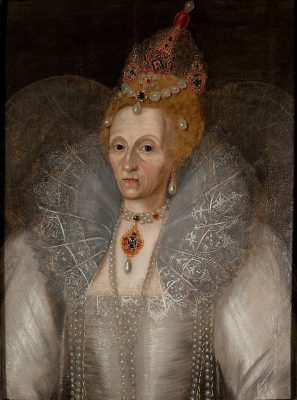William Shakespeare was born in 1564, well into the reign of Queen Elizabeth I, which started in 1558 and ended in 1603. The playwright lived most of his life under the influence of Elizabeth’s rule. But while the queen was an admirer of Shakespeare, it remains under speculation whether the two were close friends or not.
Elizabeth I was a well-known supporter of the theater. She not only enjoyed a personal interest in it but also safeguarded it from the Puritans, who wanted it outlawed. In 1583, Elizabeth I formed her own theater group, called the Queen’s Men. Her favorite actor was reportedly the comic Richard Tarleton, whose talents could make the queen cry with laughter.
Many scholars speculate about the first time Shakespeare saw the queen. It is believed that Elizabeth appeared at Kenilworth Castle in 1512 when Shakespeare was just 11 years old. The castle was just over 10 miles from Stratford-upon-Avon, Shakespeare’s hometown.
Shakespeare’s father was a town official, so it was possible that he had been invited to the special occasion and was able to bring the young William Shakespeare to the event. Shakespeare may have witnessed, with fascinated eyes, the pageantry and maybe even a performance of a short theatrical piece. Some scholars theorize that Shakespeare expressed this experience in some lines in A Midsummer Night’s Dream and Twelfth Night.
Elizabeth’s favorite actor, Richard Tarleton, died in 1588, and because of this, The Queen’s Men lost their sparkle. New forms of entertainment were introduced into the royal court. Around this time, the theatrical group Shakespeare belonged to, The Lord Chamberlain’s Men was very popular. Shakespeare and his fellow actors performed before the queen in December of 1594 and, early the following year, were paid 20 pounds for performing in comedies that the queen had enjoyed the previous Christmas. Towards the end of the 1590s, Queen Elizabeth had become very fond of The Lords Chamberlain’s Men and had them regularly performing at her court. However, scholars do not imagine that these performances were mingled with interpersonal warmth between the players and the queen. The performances strictly remained as performances, as they would have been described in the royal schedule. Shakespeare and his fellow actors are believed to have regularly undergone serious rehearsals because they were to perform in front of the queen. Before the actors’ lines were finalized, the person in charge of the affair, called the Master of the Revels, would have cut out some parts of the dialogue to make sure the queen would not hear anything that would offend her royal tastes. Afterward, the players would be supplied with the necessary and lavish costumes.
It is possible that every time The Lord Chamberlain’s Men performed for the queen, they would have been introduced to her first. There is no surviving account that this happened. Still, Shakespeare’s group performed numerous times for such a long time that it is easy to hypothesize that the actors eventually became friendly with the members of the court. Nonetheless, it remains unclear whether Shakespeare and the queen became very intimate with each other. Stories about the queen’s friendships remained within the realm of gossip, and there are no suggestions that Shakespeare and Elizabeth were friends. Scholars who maintain that they were not friends point out that the queen was a Protestant, while Shakespeare had Catholic leanings. Many scholars say that Shakespeare was very careful in depicting the monarchy in his plays. However, some scholars believe that in 1601, Elizabeth complained that one of Shakespeare’s plays was performed 40 times in houses and on the streets. This comment must not have been made in anger but only in annoyance because, in the following winter, The Lord Chamberlain’s Men performed six times at the queen’s court. It is even believed that before she died, she requested that A Midsummer Night’s Dream be performed.
Queen Elizabeth I died in 1603 and was succeeded by James I. The Lord Chamberlain’s Men’s name was then changed to The King’s Men. Shakespeare and his fellow actors continued to perform at the royal court more often than they did at Queen Elizabeth’s. Today, it is widely accepted that Shakespeare and Elizabeth I did not enjoy a close relationship.

